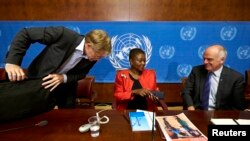The unprecedented Ebola outbreak in West Africa requires a $1 billion response to keep its spread within the “tens of thousands” of cases, United Nations officials said on Tuesday.
The virus has killed more than 2,500 people, half of the more than 5,000 people infected by the virus, and the toll has doubled in the last month, World Health Organization Assistant Director General Bruce Aylward said.
“Quite frankly, ladies and gentlemen, this health crisis we're facing is unparalleled in modern times,” Aylward told a news conference in Geneva. “We don't know where the numbers are going on this.”
He said the WHO's previous forecast, that the number of cases could reach 20,000, no longer seemed a lot, but the number could be kept within the tens of thousands with “a much faster reponse.”
US response to Ebola
President Barack Obama is due to announce new measures Tuesday afternoon to help fight the worst-ever Ebola outbreak in West Africa, including sending 3,000 U.S. troops to the region.
A White House statement detailing the program said the troops will be sent to a new command center in Liberia's capital, Monrovia, where they will help with the transportation of supplies and personnel.
The U.S. will also build and staff Ebola treatment centers, and set up a facility to train 500 health care workers a week.
A U.S. Senate panel is also scheduled to hold a hearing Tuesday on the Ebola crisis. Dr. Anthony Fauci, director of the National Institute of Allergy and Infectious Diseases, and Dr. Kent Brantly, an American physician who contracted Ebola while working in Liberia but recovered after treatment with an experimental drug, are expected to testify.
'Global response coalition'
U.N. Secretary-General Ban Ki-moon will launch a “global response coalition” in New York on Thursday, said Dr. David Nabarro, senior U.N. coordinator for Ebola.
“The amount for which we requested was about $100 million a month ago and now it is $1 billion, so our ask has gone up 10 times in a month,” Nabarro told reporters.
“Because of the way the outbreak is advancing, the level of surge we need to do is unprecedented, it is massive,” he said.
The planned U.N. Security Council emergency meeting on Ebola will be only the second public health crisis discussed by the council: They met to discuss the AIDS pandemic in 2000.
Under-Secretary General for Humanitarian Affairs Valerie Amos noted that Liberia and Sierra Leone have recently emerged from years of civil conflict and Guinea has gone through a long period of instability.
Now, she said their ability to deliver the necessities of daily life for their people is on the brink of collapse.
“And, that is why we must act now, if we want to avoid greater humanitarian consequences in the future,” Amos said.
“First, we must prevent the complete collapse of health systems in the affected countries. Already, it is estimated that more people have died from secondary aspects. For example, malaria, tuberculosis or in childbirth or from chronic illnesses then have died from Ebola,” she added.
Community-level care in Liberia
Also, the Ebola response in Liberia, where the epidemic is spiraling fastest out of control, will now focus on community-level care units since new bed spaces are unlikely to be ready for weeks or months, Aylward said on Tuesday.
“The absolute first priority is to establish enough capacity to rapidly isolate the cases so that they are not infecting others. We need Ebola treatment centers to do that, very very quickly, but they take time to build, as you've seen,” Aylward said.
“It takes weeks, if not months, to get these facilities up and running," he said. "We have firm commitments for more than 500 additional beds in Liberia and we think we will hear announcements that will take that even further over the coming weeks.”
The WHO still has a goal to “bend the curve” in total Ebola case numbers across West Africa within three months, but some areas may be free of the disease sooner, he said.
“You definitely want to get Nigeria and Senegal obviously done quickly. In some capitals - Freetown, Conakry - we should be able to get those free in the near term. Guinea should be able to get most of the country free in the very near term as well,” Aylward said.
In Sierra Leone and Liberia the disease is more entrenched over bigger geographic areas and the Liberian capital Monrovia was a “particular challenge,” he said.
One Ebola case in Senegal
The number of cases has shrunk to one single confirmed Ebola patient in Senegal, after two suspected cases were ruled out, and remained steady at 21 cases in Nigeria, Aylward said.
“I cannot say Senegal is safe. Remember, if a country has Ebola, the incubation period is about 21 days," he said. "I like to see at least two incubation periods without any cases to be absolutely sure. So that would take us way out into October. Never declare victory over this virus.”
Guinea, where the outbreak originated last December, has had 936 cases, Sierra Leone 1,602 and Liberia 2,407, he said.
Chinese team
Also on Tuesday, China dispatched a laboratory team to Sierra Leone to reinforce Ebola virus prevention work in the country, China's state-run broadcaster CCTV reported.
The team consists of 59 experts who are from China's Center for Disease Control and Prevention, CCTV reported.
Organized by National Health and Family Planning Commission, the team is expected to participate in virus testing work in order to improve lab testing ability, CCTV said.
In a bid to halt new infections, Sierra Leone is going to restrict residents to the areas around their homes for three days from September 19. The move should also help health workers track down people suffering from the disease.
The Chinese team will help test suspects during the three-day lockdown, CCTV reported.
Lisa Schlein contributed to this report from Geneva. Material for this report came from Reuters and AP.





